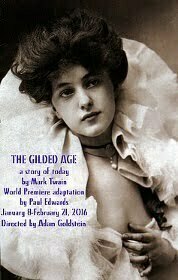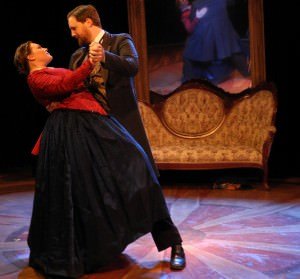The Gilded Age: A Tale of Today
Written by Mark Twain & Charles Dudley Warner
Adapted by Paul Edwards
Directed by Adam Goldstein
Produced by City Lit
A Confused, Meandering Tragedy That Thinks It’s a Satire
Mark Twain and Charles Dudley Warner preface their 1873 novel The Gilded Age by writing that “It will be seen that it deals with an entirely ideal state of society; and the chief embarrassment of the writers in this realm of the imagination has been the want of illustrative examples.” This, of course, is irony, but having never read the novel I cannot speak to its satire. Assuming, however, that Paul Edwards’ source material indeed was satirical to its age, the strangest – and perhaps most telling – aspect of his adaptation is that what once was a satirical reflection on America has now become the conventional state of affairs. That is to say, City Lit’s production of The Gilded Age bares only the solitary tooth of ridicule from the biting mouth of satire, the rest – humor, irony, and exaggeration – having been plucked by the last 143 years of political and social (d)evolution; and with only this lone tooth gnawing away at us for two hours, by the end, even ridicule loses its edge to the blunting truth of our “today.”

Edwards’ adaptation streamlines the original narrative by including only Twain’s contribution to the novel: the story of Laura. Orphaned as a young girl when her parents die in a steamboat explosion, Laura (Jacquelyne Jones) is adopted into the Hawkins family, whose patriarch, Si Hawkins (Wesley Scott), later guilelessly squanders his family’s money by following the get-rich schemes of the wily Escol Sellers (Scott Olson). Before he dies, Si makes his last ruinous purchase of 75,000 acres of Tennessee land under the promise of seeing his family’s money returned a hundredfold once that land gets developed. Unfortunately for Si, that dream never materializes before he’s interred in the earth, another simple man laid victim to the cunning of the money-grubbing world.
Galvanized by her father’s failure and her innocence tarnished by her brief but transforming affair with the two-faced Col. George Selby (Drew Johnson), Laura follows her brother Washington (Erik Burke) with “a devil in [her] heart” to the Capitol to lobby for the government to purchase her family’s land. There she meets a whole host of greedy, duplicitous, and morally corrupt people – chief among them her new self. After manipulating everyone in her way, her Bill finally passes before Congress, but when her ex-lover comes into town, her memory of his hurt and betrayal stokes her passion to the boiling point, threatening to undo all that she’s fought for in a single act of revenge.
When I write the synopsis of a play, I’m often surprised to see just how compelling of a story the play I just saw contained. Then I wonder why the production I saw wasn’t at all compelling. I think the answer for City Lit’s The Gilded Age may be that Edwards tried to stay too true to Twain’s original. Though perhaps a virtue in itself, here Edwards’ fidelity leads him to paint too bland a satirical picture and to include scenes that, while perhaps exposing more of the social landscape of the past, seem redundant if not confusing in the play as a whole. Take for instance two little scenes where we meet the ladies of the nouveau and old wealth residing in the Capitol. The satire on these figures means nothing to us because, foremost, these specific character-types no longer exist for us, and their contemporary counterparts are nowhere to be seen in them. Moreover, since these characters never again appear in the play, they’re only important insofar as they affect Laura’s character and story – but we’ve already seen Laura debased by her morally decrepit culture, and the target of her Bill is Congress, not the idly rich housewives of Washington County. So why include them?

Besides these few vacuous women we have the many other supporting characters that make up Laura’s world – all of whom are as one-dimensional as the paper on which Laura’s Bill is written. And that’s perfect for a satire – if only their self-righteous lust for greed and wily tactics weren’t exactly what we in the 21st century have come to expect of our elected officials. The entire story and characters play out as mundanely corrupt as everyday life: there’s no absurdity, no exaggeration, no new perspective here that allows us to understand this as anything but the sad, everyday political workings up on The Hill. The story of The Gilded Age has become a naturalistic, political drama with a feminist tinge.
And what a wonderful production it would’ve been had it been directed like such a story and had the last element of satire been expunged: ridicule. But here, all the ridicule falls into the mouth of Laura, our protagonist, who needs to constantly remind us that she’s a stifled, ambitious woman living in a man’s world, as if the circumstances of the play wouldn’t show us that already – as if we imagined women had it any better 150 years ago! Far from endearing us to her character, Laura’s abrasiveness turns us away – and it does so from the start, which was a poor choice of direction if we were supposed to have felt any sympathy for Laura’s loss of innocence.
It goes without saying then that, despite her commanding performance, I never fell in love with Jacquelyne Jones’ character (which, again, not paramount for a satire, but – see above). I did, however, fall in love with Erike Burke’s Washington, Laura’s brother. Burke has such an open and honest face and communicates a genuineness so foreign to the political world in which he inhabits that you immediately recognize his innocence and pain to see him taken like a fool. At the end of the play he even thanks Sellers, the man who swindled his father out of his money – and you believe his enduring credulity! Other notable performances include Scott Olson, who plays Sellers (among others), and who finds some very interesting choices as well as intriguing beats as Representative Trollop; and Philena Gilmer and Mike Speller as Mrs. Hawkins and Senator Abner Dilworthy, respectively (among others), have such expressive faces that they’re fascinating to watch in whatever character they take on.
Great stories endure beyond their times because there’s something in them that, even after a hundred years, continues to speak truth to the world. In terms of Twain’s satirical America, we see the resurrection of his characters in the light of our 21st century world don’t bring back with them their old, ruddy satire complexion, but rather the sinister pallor of a tragic drama. That, I believe, was the story still left to tell from The Gilded Age: whatever satire it once contained has since become passé. Modern satire demands more outlandish exaggeration, or – when even that fails to stretch the appearance beyond its already warped nature – utter absurdity. City Lit’s The Gilded Age is certainly a “Tale of Today,” but no longer in the manner Twain meant.
Somewhat Recommended
August Lysy
Reviewed on January 24th, 2016
Playing at the City Lit Theater, 1020 W Bryn Mawr Ave., Chicago. Tickets are $29. For tickets and information, call the City Lit box office at 773-293-3682, email [email protected], or visit www.citylit.org. Performances are Fridays and Saturdays at 7:30 p.m. and Sundays at 3 p.m., with additional performances Thursday Feb. 11 and 18 at 7:30 p.m. Thru February 21. Running time is 2 hours with a 10-minute intermission.
